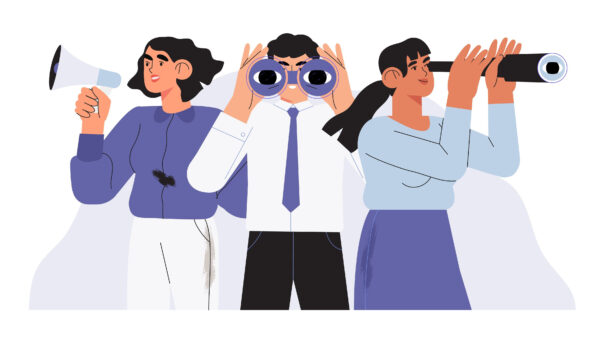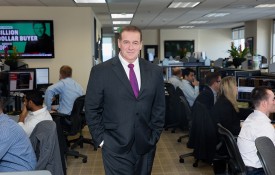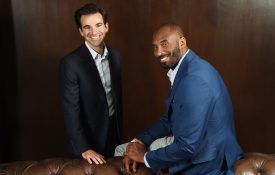Picture yourself ducking into a delicious lunch at a lively café. The food is not only tasty, it’s also well-priced, and the servers are smiling, friendly, and helpful. When you look closer, you see that most people working in the café are heavily tattooed and don’t fit the profile of who you would expect to be providing such exemplary service at a Zagat-rated, downtown L.A. restaurant.
This was my experience dining at Homegirl Café at Homeboy Industries when I was being recruited to be a board member after leaving my lucrative private-sector leadership position. I vividly remember having the (admittedly terrible) thought that I would NEVER have hired any of the folks working at the café when I ran a $1.5B business in the private sector.
 But times have changed. My ego has been punctured, and I don’t worry about how I am “measuring up” in the traditional sense of the phrase. Through dedication to service and adopting an attitude of humility, my priorities have shifted, and nearly 11 years later, I consider my life’s work to be hiring the underserved. Some of the people working at Homegirl Café that day are now managers and business leaders across Homeboy Industries and our social enterprises. Yes, these people and those following in their footsteps now work across multiple thriving business units. These folks have benefited from THE HOMEBOY WAY—people who once would have been demonized by society and essentially thrown away, denied a second chance.
But times have changed. My ego has been punctured, and I don’t worry about how I am “measuring up” in the traditional sense of the phrase. Through dedication to service and adopting an attitude of humility, my priorities have shifted, and nearly 11 years later, I consider my life’s work to be hiring the underserved. Some of the people working at Homegirl Café that day are now managers and business leaders across Homeboy Industries and our social enterprises. Yes, these people and those following in their footsteps now work across multiple thriving business units. These folks have benefited from THE HOMEBOY WAY—people who once would have been demonized by society and essentially thrown away, denied a second chance.
Ten years ago, I had no idea how much I would be changed to my core when I became the first CEO of Homeboy Industries, the world’s largest gang rehabilitation and reentry program. I have the privilege of being hands-on at Homeboy every day, driving hiring practices that are antithetical to traditional corporate hiring practices.
Our goal each day is to create a sustainable workplace culture where people can thrive. As Fr. Greg Boyle, who founded Homeboy Industries 35 years ago, says, “Achievements are a by-product of thriving.” In that spirit, we have created and cultivated an environment where formerly incarcerated gang members can soar and dreams can be realized, all while driving revenue and delivering excellent services and products across Los Angeles and beyond.
 Our efforts focus on providing an atmosphere in which people flourish and blossom so they can find their own worth. Imagine a society that collectively pursues and reaches the goal of having thriving workplaces, where we can do away with meritocracy and simply celebrate achievements.
Our efforts focus on providing an atmosphere in which people flourish and blossom so they can find their own worth. Imagine a society that collectively pursues and reaches the goal of having thriving workplaces, where we can do away with meritocracy and simply celebrate achievements.
I firmly believe that the business community can lead the way in alleviating poverty by providing opportunities for the underserved of our society to have quality jobs.
We’ve developed a blueprint at Homeboy for why and how to hire differently, and I also outline some of these tenets in my book, The Homeboy Way: A Radical Approach to Business and Life. As of fall 2023, we operate 13 social enterprises employing 135 people across businesses ranging from catering to recycling. We can tell you from experience that it’s all about a mindset shift, and the “extra” costs are minimal—and the rewards are many.
I hope you’ve seen Homeboy do this and witnessed how our businesses operate in action. If you still need to learn more, there are many ways to connect with Homeboy across L.A. and beyond. Come to our downtown headquarters for a tour or a delicious meal (of your own) at Homegirl Café.
As a business leader, you might be wondering how YOU might hire the working poor, hourly wage workers who might need a leg up. How do you get the unemployable to become not just employable but great employees?
Below is the beginning of a step-by-step process that will help guide you in changing your hiring practices.
Step 1: Make sure all the jobs are quality jobs, ones that have respectable wages, benefits, safe environments, predictable scheduling, and upward mobility.
Step 2: Make the decision that you will positively affect society and the culture of your business by engaging in what might initially feel like counterintuitive hiring practices. The goal is to hire the working poor as 10% of your staff. You will probably feel uncomfortable doing this because it flies in the face of every business concept you’ve learned your whole life, but it’s helpful to surrender to the process.
Step 3: Surround your new employees with support, non-judgment, and compassion. Furthermore, be willing to suspend the typical “work rules” that might trip up a returning worker. For instance, if a worker has to take two buses to work early in the morning, the employee shouldn’t be penalized if the bus is late.
Step 4: Understand that advancement incentives are different, and you need to proactively promote people with lived experience. The benefits are multifold; You’ll have committed managers and your frontline workers will start to imagine that they can also get there.
Step 5: When problems arise, resist the notion of judgment. Work to figure out the causes of the behavior that is not productive. People want to do a good job, but life’s challenges often get in the way. Be an organization that helps people thrive.
Again, these initial five steps are broad strokes; the critical idea is just to start. You can even begin by hiring one or two people who need a chance (or a second chance). You will make a difference. Paying it forward will make you feel good about yourself, and it will also help your company’s bottom line over time. This simple yet meaningful action has the power to be transformative.
In fall 2023, we will begin offering THE HOMEBOY WAY training for corporate leaders, executives, and staff. To learn more, please reach out to me and my team at TheHomeboyWay@homeboyindustries.org.
Thomas Vozzo left a lucrative career in corporate America convinced there had to be a better way to define success. In 2012, Vozzo became the first-ever CEO of Homeboy Industries, the largest and most successful gang intervention, rehabilitation, and re-entry program in the world.














































